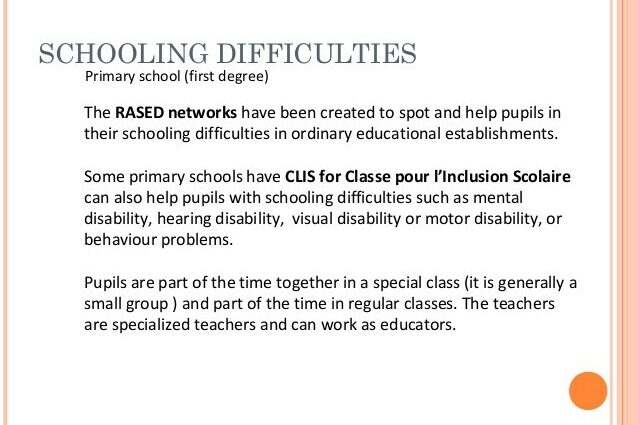Contents
Rased: how does the network of specialized help for pupils in difficulty work?
Students with academic difficulties can benefit from the services of RASED, the Specialized Aid Network for Students with Difficulties. From kindergarten to CM2, trained professionals, teachers, psychologists, are available to students to support them in their learning. This follow-up is complementary to that of the teachers in their class. It allows children to breathe a little, by offering them tips, personalized listening and time to assimilate the concepts.
Who is RASED for?
Some children do not assimilate the learning, the rules of well-being in society, the school standards at the same pace as their peers. In great pain, they need help.
The objective of National Education is to “develop the potential of all students, to lead them to mastering the common base of knowledge, skills and culture while ensuring for each of them the conditions for their success” , the RASED was set up for these children who want to, but who, despite the instructions of their teachers, do not manage to respond. These students can be oriented towards the network for different reasons:
- classroom behavior;
- understanding of instructions;
- learning and / or memorization difficulties;
- temporary problems due to difficult family situations.
The objective is to enable them to become aware of their difficulties and to support them to enable them to acquire the basics of collective life, to learn independently and to be able to continue their education serenely.
Network professionals
Teachers have very little training in child psychology. They are therefore often helpless in the face of serious issues.
The professionals appointed to RASED are trained both on the concepts of learning, but are also psychologists specializing in young age. Psychologists, specialist teachers, they will help identify the brakes. They work with students in class, in small groups, from kindergarten to CM2.
What are the objectives of RASED?
RASED professionals work as a team. Their first mission is to gather all the information that can help them to take stock of the difficulties encountered and the student’s profile. This assessment will allow them to propose and build with the students’ teachers and their parents, an appropriate response, to allow them to advance in their learning.
The RASED will also make it possible to set up a PAP, Personalized Support Plan, and will monitor its implementation in the establishment. The team also monitors PPS, Personalized Schooling Projects.
Clearly defined in 2014, the missions of specialist personal teachers fall within the framework of the educational program. In each of the 1st degree constituencies, it is the Inspector of National Education who decides on the implementation of aid to students and teachers, “he decides on the general organization and the priorities”.
Aid, in what forms?
At any time during the year, parents as well as the educational team can call on RASED, under cover of the inspector’s authorization.
A specialist teacher and / or a psychologist will then be assigned to report on the difficulties by meeting the educational teams, the parents and the student. He can also call on the attending physician if he wishes to prescribe the performance of check-ups (speech therapist, ophthalmologist, etc.).
These aids have three dominant forms:
- learning-oriented monitoring;
- educational support;
- psychological support.
Learning-oriented monitoring concerns students who have learning delays, comprehension and / or memorization difficulties.
The teaching professional will seek to understand where the student’s possibilities are and will use them to allow him to find the resources and create a link between the areas in which he is comfortable and those that will ask him to concentrate. a bit more.
As far as educational support is concerned, it will rather be a question of reviewing the rules of socialization. Sometimes the learning of these social norms could not be done, and the child needs a tutor to learn, or better to assimilate the importance that they have to grow well together. This mission is closer to the profession of educator than that of teacher and requires listening and a certain flexibility with regard to the child’s course.
Finally, psychological support will be necessary when the academic difficulties are clearly linked to those in the child’s personal life:
- health concerns;
- domestic violence;
- mourning ;
- difficult separation of parents;
- arrival of a little brother or sister badly lived;
- etc.
A child can occasionally present a problem related to a personal situation that he cannot manage emotionally.
Support for teachers
The teachers are neither psychologists nor specialized educators. They are the guarantor of pedagogical learning for a group of students sometimes going to more than 30 per class. Enabling them to obtain support and listening from qualified professionals is therefore essential according to Thérèse Auzou-Caillemet, master E and president of the FNAME, which specifies that this Network is also there to give them keys.










